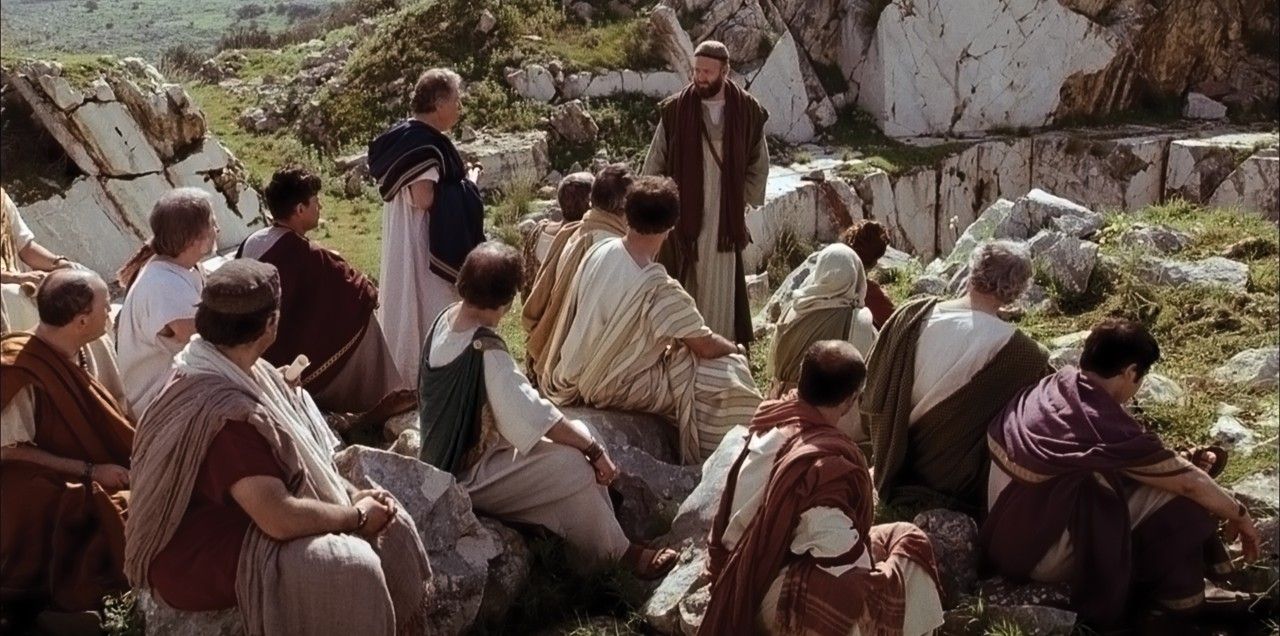To accompany your Come Follow Me study for July 24-30
In addition to reading the indicated chapters, you may wish to:
Read the applicable portions of the New Testament Institute Student Manual at:
See the following videos:
- Come Follow Me (July 24-30) | Paul’s World Tours: 2 & 3| Acts 16-21 at Come Follow Me (July 24-30) | Paul’s World Tours: 2 & 3| Acts 16-21 – YouTube
- We are the Offspring of God at We Are The Offspring of God – YouTube
- I’ll Go Where You Want Me to Go at I’ll Go Where You Want Me To Go – YouTube
- Acts of the Apostles (minute 1:42:21-2:26:21) at https://www.youtube.com/watch?v=q5bTIUrUw0M
If you would like a Kahoot game related to this material which you could use for personal study or use with your family or your class, click here: https://create.kahoot.it/share/acts-16-21/fb5280ae-bbbb-4c41-98b1-f439bbd2b6a0. (To use it with a group, after clicking on this link, you will need to log into Kahoot, creating a free account if you have not done so previously, then click on the blue “Start” button.)
Points to Ponder in Acts 16-21
1. Which would you single out as the two most important verses in this week’s reading to you personally?
2. What is the funniest incident you encountered in these chapters?
3. Why would evil spirits prompt a possessed woman to testify that Paul and his companions were “servants of the most high God, which shew unto us the way of salvation”? (16:17) And why wouldn’t Paul be grateful for any support he could get?
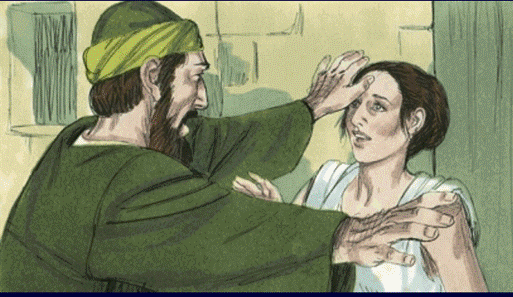
4. 16:31: Why do Latter-day Saints insist one must earn his salvation through good works, when Paul clearly taught that all that was necessary for the jailer and his family to be saved was for them to “believe on the Lord Jesus Christ”?
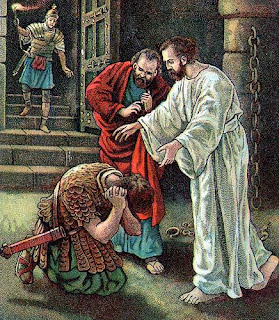
5. Why would Agabus and other disciples be inspired to warn Paul not to go to Jerusalem, if he himself had been inspired to go? (20:22-24; 21:4, 11-12.)
6. How many revelations, miracles, or other spiritual gifts experienced by the early church can you find recorded in Acts 16-21?
7. Can you find passages which illustrate up to 12 principles of good missionary work and identify each principle?
8. Can you find passages in Acts 16-21 to support each of the following distinctive Latter-day Saint doctrinal teachings?
- Man had a premortal existence.
- You are born on this earth at a time and place previously foreordained by God.
- God has a body of flesh and bones, and we are literally His offspring.
- People are not to be condemned for not living gospel laws they didn’t know about.
- Authority is necessary in the ministry.
- Conferral of the Holy Ghost through the laying on of hands is essential.
- The disciples assembled on the first day of the week (Sunday) to worship and partake of the sacrament, supporting the idea that Sunday was the new Christian sabbath.
- A great apostasy foretold.
Possible Answers to Points to Ponder in Acts 16-21
1. Which would you single out as the two most important verses in this week’s reading to you personally?
Your choice. For me it would be
- 17:28-29: Paul’s message on Mars Hill that we are literally the offspring (not merely the creation) of God, which tells us much about the nature of God and the nature of man and our premortal existence with our heavenly parents.
- 20:35: It is more blessed to give than to receive. This is the very heart of true Christianity, but a part that some professed disciples never really learn.
2. What is the funniest incident you encountered in these chapters?
Your choice. But for me, it has to be Paul’s extended discourse in Troas, lasting until midnight, and resulting in poor Eutychus going to sleep and falling from the third loft, apparently to his death. But after interrupting his talk long enough to heal Eutychus, the long-winded Paul didn’t take a hint that his discourse was becoming tedious but continued speaking to those assembled until morning! (20:9-11). As funny as this may seem, of course, we have to assume that both Paul and his listeners may well have recognized that Paul’s impending departure for the last time justified his taking the time he did.
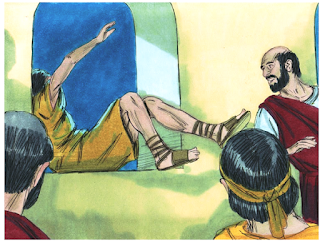
In second place would be the seven sons of Sceva, who tried without authority to cast out an evil spirit, only to be attacked by the man with the evil spirit, who said, “Jesus I know, and Paul I know; but who are ye?” and who then “leaped on them, and overcame them, and prevailed against them, so that they [all seven of them] fled out of that house naked and wounded.” (19:15-16)
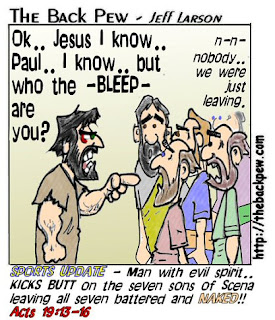
3. Why would evil spirits prompt a possessed woman to testify that Paul and his companions were “servants of the most high God, which shew unto us the way of salvation”? (16:17) And why wouldn’t Paul be grateful for any support he could get?
Elder Bruce R. McConkie gave the following explanation: “The testimony of the devil-led damsel was true. Paul and Silas were prophets; they had the words and power of salvation. But true testimony from Satan’s servants does not lead to salvation. In effect the damsel was saying: ‘Go ahead and believe in Paul and Silas and this Jesus whom they preach. I agree they and their Master are of God; and since we are now united on that point, you can also continue to follow me and enjoy the fruits of my divination.’ And how many other practitioners of false religions there are who give lip service to Jesus and his doctrines so that people will the more readily follow them and their special brand of ‘saving’ grace. It was for the very reason here involved that Jesus himself forbade the devils whom he cast out to testify that he was the Son of God (Luke 4:41.)” (Doctrinal New Testament Commentary, 3 vols. [1965–73], 2:149).
4. 16:31: Why do Latter-day Saints insist one must earn his salvation through good works, when Paul clearly taught that all that was necessary for the jailer and his family to be saved was for them to “believe on the Lord Jesus Christ”?
Despite this common misconception, Latter-day Saints do not teach that one must “earn” his salvation through good works. But while we don’t “earn” salvation, we do have to “qualify” for it through an active faith which results in good works, as James 2:14-17 clearly teaches. The Book of Mormon, in Helaman 14:8, says essentially the same thing Paul said: “Whosoever shall believe on the Son of God, the same shall have everlasting life.” But lest anyone think this is too simple a path, five verses later it adds, “And if ye believe on his name ye will repent of all your sins, that thereby ye may have a remission of them through his merits.” In other words, we are not saved by our good works, but neither are we saved without a desire and effort on our part to do such works, as instructed by Jesus. We can’t truly say we believe in Him if we aren’t willing to do what He asked.
5. Why would Agabus and other disciples be inspired to warn Paul not to go to Jerusalem, if he himself had been inspired to go? (20:22-24; 21:4, 11-12.)
Agabus and the other disciples were right in telling Paul, through inspiration, that bondage and other dangers faced him if he went to Jerusalem. With that spiritual insight, and their love for Paul, they would naturally want to warn him not to go. But none of them had authority superior to Paul’s, and Paul had to follow the direction he personally received from the Spirit to go to Jerusalem in spite of the trials and eventual martyrdom which awaited him.
6. How many revelations, miracles, or other spiritual gifts experienced by the early church can you find recorded in Acts 16-21?
There are at least thirteen:
- 16:6: Paul is forbidden of the Holy Ghost to preach in Asia.
- 16:7: The Spirit suffered them not to go to Bithynia.
- 16:9: Vision of man of Macedonia
- 16:14: The Lord opened Lydia’s heart.
- 16:16-18: Paul casts an evil spirit out of a woman.
- 16:26: A great earthquake shakes the foundations of the prison, opens the doors, and loosens the bands off the prisoners. Skeptics could say that it was just a coincidence that the earthquake occurred, but normal earthquakes certainly don’t break the bands off from prisoners!
- 18:5: Paul was “pressed in the spirit.”
- 18:9: The Lord speaks in a vision.
- 19:11-12: Special miracles, including healings and casting out of evil spirits through Paul’s handkerchiefs
- 20:22-23: Paul went “bound in the spirit” unto Jerusalem, knowing through the Holy Ghost that bonds and afflictions awaited him.
- 21:4: Disciples warn Paul “through the Spirit” not to go to Jerusalem.
- 21:9: Philip’s four daughters prophesy.
- 21:11: Agabus through the Holy Ghost tells Paul of his future imprisonment.
7. Can you find passages which illustrate up to 12 principles of good missionary work and identify each principle?
- Missionaries should avoid giving unnecessary offense. (16:3; 21:26)
- Missionaries should follow the direction of the Spirit as to where to go and whom to contact. (16:6-9)
- Missionaries can and should be examples of cheerfulness even in times of difficulty (16:25)
- It is important to find ways to befriend and serve those whom we would teach. (16:27-33)
- Missionaries should use the scriptures in teaching. (17:2, 11; 18:18)
- Missionaries should be creative in finding people to teach, as Paul taught in the synagogue, in the marketplace, in public, and went from “house to house.” (17:17; 20:20)
- Bearing testimony is an important part of teaching the gospel. (17:23; 18:5)
- Courage is an important characteristic of good missionaries. (20:24)
- Missionaries should support themselves financially (18:3; 20:33-34);
- Reasoning is a useful activity in missionary work. (18:4, 19)
- Missionaries should be concerned about the ongoing spiritual nutrition of new converts. (20:28)
8. Can you find passages in Acts 16-21 to support each of the following distinctive Latter-day Saint doctrinal teachings?
- Man had a premortal existence. (17:28-29)
- You are born on this earth at a time and place previously foreordained by God. (17:26)
- God has a body of flesh and bones, and we are literally His offspring. (17:29)
- People are not to be condemned for not living gospel laws they didn’t know about. (17:30)
- Authority is necessary in the ministry. Though Apollos was a fervent believer, he had evidently not been properly prepared and authorized as a missionary, or he would have known about the need for the Holy Ghost following baptism. Therefore, Paul rebaptized Apollos’ converts and laid hands on their heads for the reception of the Holy Ghost. (18:25-28; 19:1-6.) The need for divine authority is also shown by the story of the seven sons of Sceva who attempted to cast out an evil spirit without being properly authorized. (19:14-16.)
- Conferral of the Holy Ghost through the laying on of hands is essential. (18:25-28; 19:1-6)
- The disciples assembled on the first day of the week (Sunday) to worship and partake of the sacrament, supporting the idea that Sunday was the new Christian sabbath. (20:7)
- A great apostasy foretold. (20:29-30)
